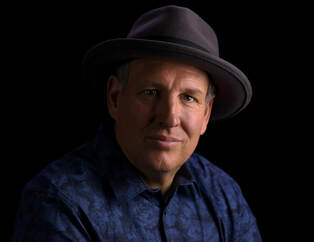 Bret R. Wright is a middle school teacher, freelance writer, and author. A retired Chief Petty Officer, he traveled extensively all over the world while serving in the U.S. Navy, and still enjoys exploring the globe with his wife and youngest son. Wright enjoys running and hiking the trails in the foothills near his home in Monument, Colorado. One of my earliest memories is creating a kidnapping-slash-murder mystery for the neighbor kids to help solve. Now, I was in kindergarten at the time, and they were both much older, but they humored me as they listened to the tape the “kidnappers” left, with instructions to follow the clues to find my missing father (who was at work at the fire station.) This is where I trace the beginnings of my writing career. In that respect, my journey as a writer has been pretty short, as far as genre is concerned. Over time, I’ve experimented with different forms of writing, and ways of presenting the stories I tell. I think challenging yourself is key in growing as a writer. -- voice, genre, style, and perspective -- all of that can be dragged through the sandbox. What comes out is sometimes dirty, it might be barely readable, but, in the end, I think I’ve become a better writer for it. In my day job, I’m a middle school English teacher. Teaching kids how to write comes with the territory, and it’s a part of the job that I really enjoy. One of the best things is this epic short story project I have them do. It’s a long-term thing that runs most of the year, and it teaches the kids about the writing process as a craft. We start at the beginning, with how to write settings, then move to dialogue between characters, and moving a story forward. We talk about pre-writing, research, plotting, -- all the writing things. The lessons become more intricate as the year progresses, and we have a lot of fun along the way. By spring the kids have these wonderful short stories that range somewhere between six thousand and twenty thousand words long. Even the kids who “hate to write” turn in these amazing stories that they’re proud of. I mean, they really are! Those kiddos are part of what keeps me motivated. I get to go back to the basics and remember why I love to write. At least in my case, that’s an important aspect of keeping the creative juices flowing. In addition to my kids, I also get a charge out of just hanging out with other writers. Is there anything more inspiring than spending time with a roomful of writers? Keep your motivational videos and Instagram quotes, and give me some living, breathing authors in a hotel bar at a writers conference any day of the week! Some of the best ideas I’ve ever had have arisen organically from just riffing with other folks in the writing community. I love hearing about projects, ideas, finished manuscripts, and people’s adventures in publishing. I’m not picky about the “kind” of writers I hang with. They don’t have to be genre contemporaries by any means. I have great friends who write romance, poetry, science fiction, spiritual realism, horror -- the whole spectrum, really. The other day I attended an album release party. I didn’t know the artist whose music had just dropped, but I did know some of the poets who attended. Poets really have it going on when it comes to supporting one another. I watched as a good friend of mine tore into her slam poetry performance with a vengeance, and worked that room like nobody’s business. It was awesome, in the most literal sense. I left in complete awe of my friend and her ability with words. I also left with ideas for stories and articles raging in my head, and I had to get them out. I went straight home and wrote until the wee hours, totally invigorated. That has been the fuel of my writing. People are surprised when I tell them I’m actually an introvert. Well, I mean I’m situationally introverted. Classically, big crowds of strangers leave me exhausted but get me around people I know, or in a performance spotlight, and I’m instantly energized, and my head fills with ideas. Locking myself away to write isn’t all that effective unless it’s in the context of a retreat with a couple of other folks. Some people fill their wells in quiet, and I get that, but my charge comes from others, even if all I do is sit quietly in the corner and take in the energy. Do you know who I’d like to hang with? Tim Dorsey and Tom Robbins. Only a voice like Dorsey’s could pull off a main-character like his Serge Storm. A serial killer as the hero who outthinks the bad guys and the cops, and there’s humor? Are you kidding me? Add in the mind of the man who waxes so eloquently absurd about Woodpeckers, Frog Pajamas, and Fierce Invalids. I love the idea of sitting around and tossing out weird ideas and out-there topics. I think it would be a hoot! Nasty People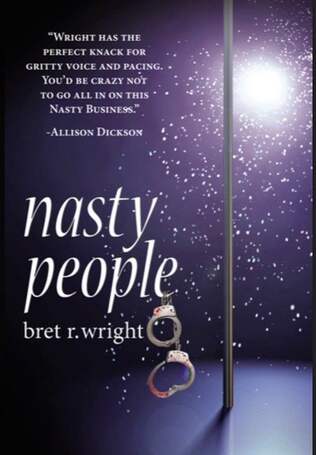 Private Detective Nate "Nasty" Jepson's sense of right and wrong leads him into the dangerous world of human trafficking, where he risks everything to save one man and bring another to justice the only way he knows how: Things get Nasty. Find Bret on Facebook, and Twitter Where to Buy Nasty People
0 Comments
Kathryn Mattingly has always had a passion for writing. Five of her short fiction pieces have received recognition for excellence and are included in her short story collection, Fractured Hearts. Her literary suspense novels include Benjamin, Journey, Olivia's Ghost, and The Tutor. She has earned a bachelor of arts from the University of Oregon and a master of arts from Pacific University in Forest Grove, Oregon. Kathryn lives on a mountain in Central Oregon with her husband and their two cats. When not penning her next novel, she teaches writing at the local college. 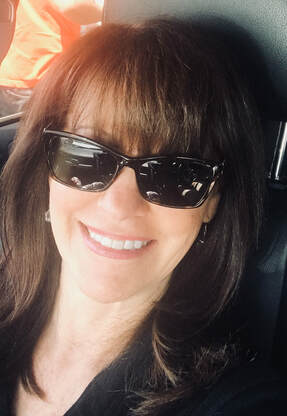 'The Tutor' has a very interesting plot. Where did you get the idea for it? My daughter lived in Roatan for a few years and I visited often. I wrote a detailed journal whenever I was there, knowing one day it would be the setting for my fourth novel. For psychological reasons I have yet to understand, all of my novels involve a child. My heroines are either trying to protect an unusually gifted child from the world at large, adopt a child in a questionable manner, find a missing and presumed dead child, or hide and heal a child that has been traumatized. This, of course, sometimes makes my heroines look more like backdoor villains, unless you closely examine their motives. When constructing the plot for ‘The Tutor’ around a traumatized child, my goals were, as always, to show the resilience, persistence, determination and strength of mothers everywhere, and even more specifically, women. When we set our minds to it, there is nothing we can’t accomplish. Men of course have always known this. I think it’s why they work so hard at trying to hold us back. What will their recourse be once we take over the world? (Visualize an emoji laughing face :) How has your creative process changed with your growth as an author? I work a lot harder at having the reader relate to my heroine from the beginning of the novel. It was a little disconcerting to learn that my heroines weren’t especially likable in the beginning of my books. I’m all for Scarlet O’Hara type heroines, but only to a point. Have you always liked to write, or did this gift reveal itself to you later in life? I have been writing since I could hold a pencil. I had a reputation for sketching seascapes on my math papers and writing stories on the back. I guess I was always subconsciously rebellious toward a school system that doesn’t value right-brained thinkers. Vandalizing my math papers was only one of many ways in which I let my creativity plow over their unimaginative curriculum. Those few teachers who understand me predicted I would write books one day. Do you know what you'll be penning next, and can you share a little about it? My next novel, surprisingly, will also involve a child. This time my heroine wants to get pregnant so badly she overlooks never having loved her husband, just to make it happen. True to my style, a lot of ponderous plotlines are in this book. The story begins in wine country, specifically Napa, California (where we lived the last 2 years until moving back to Oregon). It shifts between there and Central Oregon. All of my books have a couple wildly different settings, and all of them are based on places I have lived or traveled. This might be why settings are considered one of my strengths. There is a little girl in the novel, and I can’t say any more about that without revealing too much. The reader will have to decide if Katia (my heroine) is really in a coma, or has left her physical body and been transported to another time and place. Perhaps both? Part of the suspense involves her villainous husband, and what measures he will take to end her life, whether in a coma, or not. 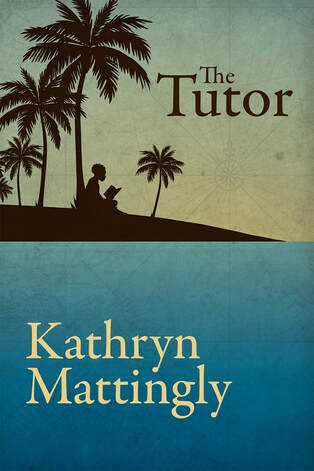 THE TUTUR Natalie (the tutor) is fleeing her unconscionable husband. Matti is fleeing what he witnessed his father do. They end up on the little known island of Roatan, where Natalie’s new friend, Izzy, is fleeing from old island ways that hold women back. Nic, who ends up on the island through a strange set of circumstances, wants to flee his overbearing family. But at what cost will each of them find their redemption? FROM AMAZON REVIEWS Beautiful story of a woman’s journey to empowerment… Love, Betrayal, and Paradise - what more could you want… Lyrical and suspenseful tale of escape and renewal… AUTHOR PAGES
Kathryn and I traded interviews this week. You can read mine on her blog.
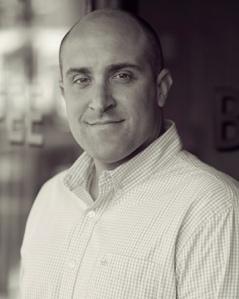 TJ Turner is an award-winning novelist, a historian, a research scientist, and a federal Agent. He has a PhD in Mechanical Engineering and Material Science from Cornell University. As a reserve military officer, he served three tours in Afghanistan and was awarded the Bronze Star Medal twice (2013 and 2017). Angel in the Fog is Turner’s third novel and a prequel to Lincoln’s Bodyguard and Land of Wolves. Turner’s novels have one won the Darrell Award for Best Mid-South Novel, the International Book Award for Historical Fiction, the Best Book Award for Historical Fiction, and the Military Writers of America Gold and Silver Medals. Turner lives in central Ohio, with his wife, Nancy, and three children. Like most authors, I’ve been writing a very long time. I’ve only known a few people who woke up one day, decided to start writing, and were good enough to get those early projects published. In fact, of the few authors I know who fall into this rarefied category of near super-human literary geniuses, I believe all of them (with the exception of one) regret how fast that early success came. That’s not to say that they aren’t grateful for the meteoric rise of their writing journeys, but most were at least slightly pigeon-holed into a genre, or a series, or something that built barriers to their development as a writer. In other words, they never had the chance to really struggle and define themselves through that struggle. So, the first thing I emphasize to any new writer I meet, or anyone years in and still trying to get published, is that the struggle is just as much a part of the creative process. I feel it’s an important part, and it’s ok to try new things, new genres, new characters, new writing styles, as you settle in on your own personal writing journey. I struggled. I still struggle, and I don’t fight it. The struggle forces me to develop and evolve, and I think that with each book my writing gets stronger, my stories get crisper, and my readers more drawn in to the world and characters I create. I started off writing short stories—science fiction. And they were horrible. I didn’t understand how a story arc should work. I didn’t understand how a character should grow and change. I tried to write very literary science fiction, which if it even exists, has got to be the smallest sub-genre in the world. My writing reflected my reading world at the time, limited to Isaac Asimov with the occasional jaunt into Robert Heinlein. It wasn’t until I started reading more widely and discovered just how much I loved fiction of every flavor—and non-fiction, too! I found myself drawn in by American history, alternating a novel (Cold Mountain, Enemy Women, The Things They Carry) with great non-fiction (Bury My Heart at Wounded Knee or Liar, Temptress, Soldier, Spy). It took me a while to realize that while I liked science fiction, I was curious about American History. That little word—curiosity—is so important. Andre DuBois III says it best—a writer needs authentic curiosity. (If you ever get a chance to see Andre talk about writing, jump at it, or look up the many YouTube videos where he talks about his creative process). What Andre means is that you as the writer will be living with this project for 6 months, or a year, or 3 years, and you have to not only be curious enough to start the work, but you have to be authentically curious enough to pull it all together and finish. Your story and your characters have to compel you to write, to drive you to the page so you can find out what happens to them. When that happens, all that passion will come out in your writing. So, I pivoted from science fiction to historical fiction—the literary equivalent of switching from basketball to ballet. And with the first words of that very first novel (LINCOLN’S BODYGUARD), I knew I had found my place—at least temporarily. It was a challenge to fit my story into actual history—to discover voices that might otherwise be lost and try to bring them to light. Unlike science fiction where I had to build a world from scratch, my world was laid out in the history texts we all know and love (?). I now had license to concentrate on my characters, and weaving in an interesting story through the fabric of American history. Even after finding my genre (or at least the one I’m writing right now), I’ve found there are still ways to grow as a writer. My first two novels were told in first-person with a male narrator. In some ways that was an easy out for me—someone to whom I could relate. But for my third book, I needed something different. In fact, my wife Nancy helped push me down this path. She wanted a book about Molly—my female protagonist. And I wanted a book my daughters could read and find a character they could draw inspiration from—a strong, intelligent female lead who not only lives but thrives in the male world of 1862 America. Even though I am biased, I think ANGEL IN THE FOG delivers upon that promise. I feel it’s my best writing yet, because I struggled outside my comfort zone. In truth, I was worried about creating a book with a female lead—to write authentically from Molly’s perspective. So, it may be unsurprising that the novel is told in third-person. That choice gave me a little distance between Molly and me as the writer. Some people have strong feelings on narrative point of view, but I like to think of them as tools. I use whatever the story needs. And so, with the publication of Molly’s story this April, I’ve turned to a new project—a female protagonist who is telling me her story in first person. This new character is pushing me even further, and hopefully an even better writer will emerge! Angel in the Fog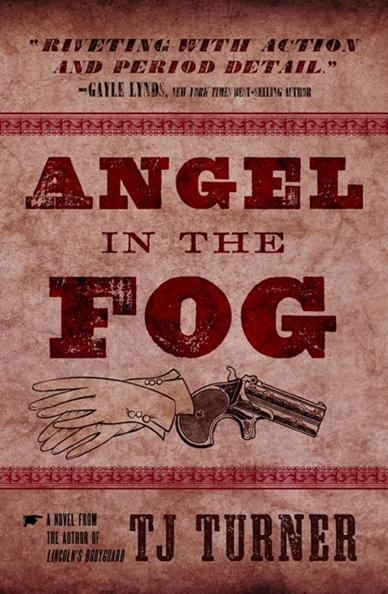 Perfect for fans of espionage thrillers, historical fiction, and indefatigable female protagonists― Molly Ferguson’s comfortable life unravels when her Louisiana home is burned to the ground, her family murdered, and she is enslaved in a Baltimore brothel. Amidst the threat of the Civil War, Molly learns of secessionist plans to assassinate President-elect Abraham Lincoln as he makes his way to Washington for his inauguration. She’s manages to pass this information on to a Pinkerton agent posing as a client. Impressed with her fortitude and intelligence, the Pinkerton Agency arranges for Molly’s freedom and brings her under the tutelage of Mrs. Kate Warne, America’s first female detective. After they save Mr. Lincoln in Baltimore, Molly is sent by the Pinkerton Agency into the Deep South―where the Civil War now rages―a spy behind enemy lines. Molly threads a thin line between revenge and redemption as she races to unravel a sinister plan that will doom the Union and allow the Confederacy to win the Civil War―while coming face to face with the demons from her tragic past. Find TJ at his website, Facebook and Twitter Where to Pre-Order Angel in the Fog Bobbie Bomar Brown is a native of Haslet, Texas. She enjoys journaling and uses that outlet in her book, The Unbreakable Cord, to relate her harrowing ordeal as her daughter fights to survive a horrific car accident. The mother of two, she now summers in the Rocky Mountains and winters in Arizona. Thank you for inviting me to be a guest on your blog. My writing has been measured by time and events. As a young girl, I recorded daily happenings throughout the pages of my locked diary. Occasionally, I was honest with myself and expressed true feelings about the life I was born into. Marriage and children marked another passage of time, busyness filled the days and nights. The grocery list and to do list replaced the diary. I would jot down a few raw feelings, but would quickly tear up those pages. Then the world rushed in and everything stopped. I was discarded for a younger model. How I wanted that pain of betrayal and rejection wiped from my calendar. Within my writing I found a different person, a person who had been locked away all those years. My journaling became my therapy and healing. One time period was filled with what I called, “Journaling through my closet.” As I removed dresses off the hanger, I cried and penned the memories which surrounded that garment. Feelings flooded me, allowing the memories to hold no power over me, I packed my wardrobe in the box marked donation. Journaling wasn’t a diary of events, but a record of what I was learning about myself. My journal entries became letters to God. Each morning, I told God my darkest secrets. He taught me about life, death, and relationships. Today, I measure time by how many years since my daughter’s car accident. My writing rescued me from my darkest cavern. This is where my writing took a different path. It was thanksgiving week-end and I had just gotten into bed, when the phone rang. A message no mother should receive, “Your daughter has been in a car accident; you need to get here as quick as you can.” The doctors said, “The first twelve hours are crucial.” While the nurses prepped her for surgery, I ran downstairs for a cup of coffee. I stopped at the gift shop, and purchased a little stuffed dog. I placed it on her chest, she laughed and called him Woody Shortly a doctor came in. His words were like a punch in the stomach. “The new x ray showed, “Your daughter’s neck ligaments are torn, and her skull is being held in place by a thin thread, it’s called, occipital cervical dislocation and C1 fracture, often called internal decapitation.” Explaining, he said, internal decapitation is very rare; the skull separates from the spinal column, and is usually fatal. “It missed her spinal cord by less than a millimeter.” The following hours were so overwhelming. I isolated myself from my feelings and emotions and tried journaling the events. But my heart wouldn’t let my mind form the words, I couldn’t face the truth. So, I used the stuffed dog, Woody, as my voice, I gave him a personality and transferred all my fear onto him. He was my escape. I journaled through the darkest time of my life. Caregiving for my recovering daughter and court hearings against the drunk driver controlled the next two years. My body moved through time, but my grief remained. I couldn’t journal. Woody sat high on a shelf. I was lost in a spiral circle of time. Fifteen years later. I decided to take all the little journal pages written through Woody’s voice and write a book. I wanted to share the painful events of each emergency and death through the heart of my faith. I needed to take ownership of my pain, but I couldn’t do it without Woody. The little dog seemed childish to editors, so publishers never entertained my book. With each rejection, I placed my journaling on hold. Then one day, I received another phone call, too horrific to spell out. I was devastated, frozen with fear and a heart ache I can’t begin to explain today. I was going to a dark place, a place I didn’t want to go. Within the next few weeks, I pulled out my manuscript and re read it, I needed to recall God’s promise of Hebrews 13 8: “Jesus Christ is the same yesterday, today and forever.” This pain was the catalyst that pushed me to finish the book. I wanted to share my journey of how one can trust that God is aware of unexpected news and He is always close. Almost fifteen years after my daughter’s car accident, I self-published, The Unbreakable Cord. Today, as I share this blog, my son is recovering from non-cancerous brain surgery. Someone asked, “Did you journal those terrifying moments, so you can write a second book? “ My past writing has made me stronger, it opened up the doors to my emotions. I no longer need a stuffed dog or a locked diary to hide behind. The raw emotions that assaulted me strengthened me and freed me to be me. I keep woody with me, not as my voice but as my inspiration for the reminder of the creativity that lies within me. I am beginning a fiction novel; however, I won’t be using Woody as my voice, but I bet one character will be a stuffed animal. How I love the season of writing I am in now. I find time to open a book by Francine Rivers and spend time in her world. The Unbreakable Cord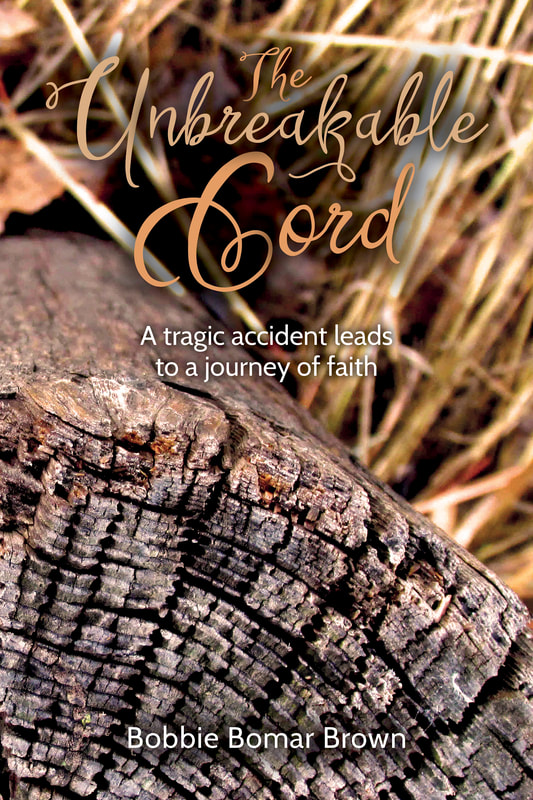 The Unbreakable Cord is the powerful story of one mother’s harrowing ordeal—an ordeal that begins in the trauma waiting area on the Saturday after Thanksgiving. With the help of a stuffed dog named Woody, author Bobbie Bomar-Brown relates the dramatic story of what happens after learning that her twenty-five-year-old daughter, Jennifer, was injured in a high-speed rear-end crash caused by a drunk driver. Jennifer has a head wound requiring twenty-six staples and an open-book pelvis break that will require surgery as soon as she is stable. But when an X-ray reveals that her spinal cord is nearly severed, save for a connection of less than a millimeter, the surgery is put on hold…and then she suffers a stroke, leaving her left side unresponsive. Jennifer will remain in intensive care for a month—with both Bobbie and Woody by her side the whole time. Amazingly, despite the alarming diagnoses and many complications, Jennifer not only survives her injuries but goes on to rehab and moves forward toward healing and forgiveness. As these overwhelming events unfold, The Unbreakable Cord demonstrates that the most difficult experiences can make a positive impact and become a stepping-stone in strengthening one’s faith in God. Where to Buy The Ubreakable Cord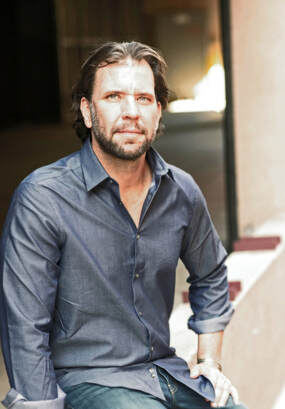 USA Today bestselling author Carter Wilson explores the depths of psychological tension and paranoia in his dark, domestic thrillers. Carter is a two-time winner of both the Colorado Book Award and the International Book Award, and his novels have received multiple starred reviews from Publishers Weekly, Booklist, and Library Journal. Carter lives in Erie, Colorado in a spooky Victorian house. You're never too old to chase a dream. Hell, sometimes you don't even realize there's a dream to chase until you're well into adulthood. That's what happened to me. It was sixteen years ago and I was firmly rooted in the world of real-estate consulting. My path had been pretty straightforward to that point. Went to school at Cornell and studied real-estate finance and didn't take a single English course, much less creative writing. Got my degree, went out to the real world, and, after a couple of years working in hotels, I applied my learning to the world of consulting. Now, this isn't to say I wasn't a reader. In my 20',s I truly discovered literature in a meaningful way for the first time (i.e., it wasn't forced upon me). I tore through book after book, rarely picking one up that wasn't at least 600 pages (I had no money, so I needed a high word-per-dollar ratio). But I wasn't writing. Didn't even think about it. It wasn't a dream. One spring day when I was 33, I was taking a dreadful all-day continuing-education class for an appraisal license I once had. I'd describe the class to you but you'd fall asleep before my first mention of discounted cash-flow methodology. There I was, bored to tears, two hours left to go. To keep entertained, I decided to give myself a puzzle. I wrote the following sentence in my notebook: Three people are murdered at the exact same time in the exact same fashion in different parts of the world. What's the connection? My challenge was to find a storyline before the end of class that would answer that question. I couldn't do it. I went home, and the question still nagged at me. Over the next few days, I decided to work on the question, writing down potential plot lines that would lead to an answer. The process became more and more complex, so I began dedicating more greater to writing down thoughts, which led to paragraphs, which turned into pages. Ninety days later I had a 400-page manuscript. I had never done anything like this before, and even though it seemed to me some kind of wonderful epiphany, I still had no idea what I was doing. No concept of what to do with my manuscript, much less if I was even a good writer. I had to learn an entirely new industry from scratch, and the more I learned, the more it depressed me. I found out that very few writers get agents, even fewer get published, and only the top .01% make any real money at it. It took a year and about eighty rejections to land my agent (the same agent I still have today). That first book never sold, so I wrote another. That one didn’t sell, so I wrote a third. And so on. It was my fifth book that finally sold, nine years after that day in the continuing-education class. Throughout the process I learned how to excel at my day job and write books on the side. I learned the beauty of rejection, and how it made me a stronger and smarter writer. I learned about patience in storytelling. Most of all, I learned about the business of writing. The wondrous, erratic, frustrating, anxiety-laced, satisfying business of writing. No school could have taught me any of those things. I unearthed a dream I never knew I had, which might just be the best kind of dream. Since the day I began my writing career, I've published five novels (all thrillers), with a sixth scheduled for publication in July 2019. My most recent novel, Mister Tender's Girl, was published in February 2018 from Sourcebooks Landmark. Inspired by the real-life Slenderman crime, Mister Tender's Girl tells the story of Alice Hill, who, at fourteen, was viciously attacked by two of her classmates and left to die. The teens claim she was a sacrifice for a man called Mister Tender, but that could never be true: Mister Tender doesn't exist. His sinister character is pop-culture fiction, created by Alice's own father in a series of popular graphic novels. Over a decade later, Alice has changed her name and is trying to heal. But someone is watching her. They know more about Alice than any stranger could: her scars, her fears, and the secrets she keeps locked away. The book is a story about Alice having to confront her past in order to survive her present. Mister Tender's Girl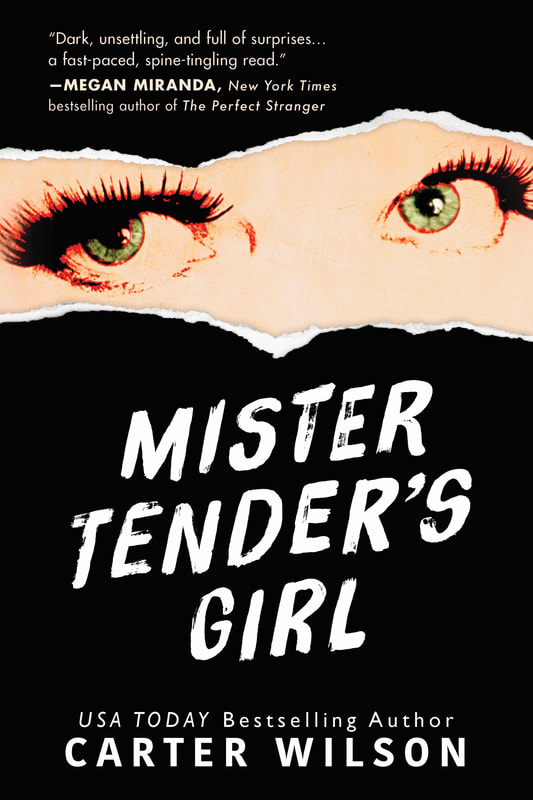 At fourteen, Alice Hill was viciously attacked by two of her classmates and left to die. The teens claim she was a sacrifice for a man called Mister Tender, but that could never be true: Mister Tender doesn't exist. His sinister character is pop-culture fiction, created by Alice's own father in a series of popular graphic novels. Over a decade later, Alice has changed her name and is trying to heal. But someone is watching her. They know more about Alice than any stranger could: her scars, her fears, and the secrets she keeps locked away. She can try to escape her past, but Mister Tender is never far behind. He will come with a smile that seduces, and a dark whisper in her ear... Inspired by a true story, this gripping thriller plunges you into a world of haunting memories and unseen threats, leaving you guessing until the harrowing end. Find Carter at his website and on Facebook, Twitter and Instagram Where to Buy Mister Tender's Girl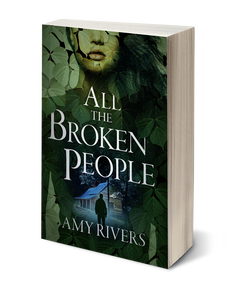 It’s day one of what promises to be a busy, crazy, and joyful year for me. All The Broken Peoplewill be released on March 5. I’m excited and nervous and a whole bunch of other emotions that overwhelm authors as their book launches approach. For those of you in the Boulder area, I’ll be holding a big launch party at Lunada Eatery & Cantina. They hosted my last book launch and it was a wonderful evening. Great food and lots of celebrating! I’ll be doing some traveling this year, both for business and for fun. Looking forward to my 3rdyear at Thrillerfest in July and my first year at Bouchercon. Over the summer, my sister and I are taking my mom and aunt to France for a two-week adventure! That rip will be bookended by a mini-book tour in New Mexico and a conference in New York City so if you see me looking a little discombobulated, you’ll know why. Over the holidays, my husband and I made a trip to Georgia to say a final farewell to my mother-in-law, who passed away on Thanksgiving. It was a bittersweet trip to say the least, but visiting Jasper and meeting family members for the first time filled my heart with love and hope. The kudzu is dormant but the landscape is plenty breathtaking to captivate the imagination of this desert-born girl. So, as I work fervently toward putting my book out into the world, I am wishing you all a Happy New Year with lots of great reading! Please stay tuned for news about the book and related events. Hello, 2019! Let’s do this thing. |
AuthorI'm generally pulled in a million different directions and I wouldn't trade it for the world. Here's a glimpse of my life - hope you enjoy it! And if there's a big lapse between posts, well, that's the way life goes in Amy's world. Archives
October 2022
Categories
All
|
|
Copyright 2024 by Amy Rivers. All rights reserved. |
 RSS Feed
RSS Feed